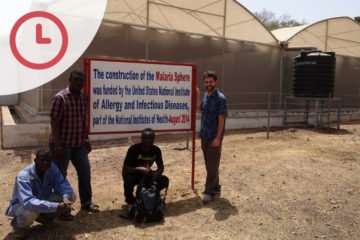Podcast Available on iTunes and Spotify.
Welcome back to Five Minutes, the podcast series where we speak to the most interesting people in the world of malaria.
Today I’m delighted to be joined by Professor Archie Clements who is Pro Vice-Chancellor of Health Sciences at Curtin University in Australia.
He’s also an NHMRC Senior Research Fellow, having received over $28 million in research funding, and authoring more than 190 peer-reviewed publications.
I’m keen to know what he thinks about the Malaria World Congress that took place in Melbourne earlier this year, and his thoughts on the FDA’s approval of Tafenoquine.
If you’d like to stay up to date with the latest malaria interviews, you can subscribe on iTunes and Spotify.
This is Five Minutes with Professor Archie Clements.
Could you give me an overview of what you do on a day to day basis?
Well, my current role is Pro-Vice-Chancellor for Health Sciences at Curtin University, and in that role, I combine a management role with my ongoing interests in infectious disease research. Mainly these days my research is done through working with my PhD students and post doctor or research fellows and also through collaboration.
It feels like a long time ago now but what did you think of the Malaria World Congress earlier this year?
Well, I thought it was great for Australia to attract so many high profile malaria experts and researchers from around the world. I thought it was a really successful conference, a lot of good talks, a really good networking opportunity. I guess the interesting thing will be working from here and my question is whether there will be a second Malaria World Congress, hopefully, there will be, but it’s a pretty crowded calendar of conferences and meetings relating to malaria. I think it would be really important to work out what the particular focus or role of a second Malaria World Congress would be.
It’s been described as a ‘platform for the future’, what do you think of that description?
Well, I think that’s an interesting description, I guess the question of what particular kind of future we’re talking about. I think there’s definitely a place for more malaria research forums in the Asia-Pacific region. I think that the world’s pretty well catered for in terms of malaria conferences and workshops and meeting opportunities for the Western Hemisphere, but I think there could be a real niche here for a forum that allows academics, researchers and implementers to exchange ideas, particularly on the Eastern Hemisphere. I think that would be where the opportunity lies.
I wonder if you could tell me what challenges we are facing we’re currently facing with malaria preventions and malaria interventions?
Well, I think that we know an awful lot now about how to control and eliminate malaria. So I think the challenges lie with the implementation of what we know, so it’s around how we utilise routinely collected data to help control programs make better-informed decisions about where they put resources, how they mobilize resources, how they achieve sufficient coverage of interventions in order to interrupt transmission of malaria. So I think that’s really where we’ve got to focus on, we’ve got to focus on taking evidence that’s already readily available and working out how to implement that in practice and at a sufficient scale. The other issue related to that is sustainability, how do we make sure that malaria interventions are maintained for years and ideally decades to ensure that we actually do control and ultimately eliminate malaria.
Moving on to a slightly different topic, we’ve been covering the story of Tafenoquine being approved by the FDA for quite a while, we’ve got a series of podcast interviews surrounding drug. What do you think about the FDA’s approval of Tafenoquine, GSK’s new malaria drug?
Well, I think Tafenoquine’s a very exciting development and I think it will be transformative particularly in dealing with Plasmodium vivax malaria which is going to present one of the greatest challenges to malaria elimination. The current treatments are difficult to implement, Tafenoquine will solve some of the logistical challenges of dealing with vivax malaria so I think that very exciting development.
Professor Archie Clements, thank you.
You’re welcome, thank you.


